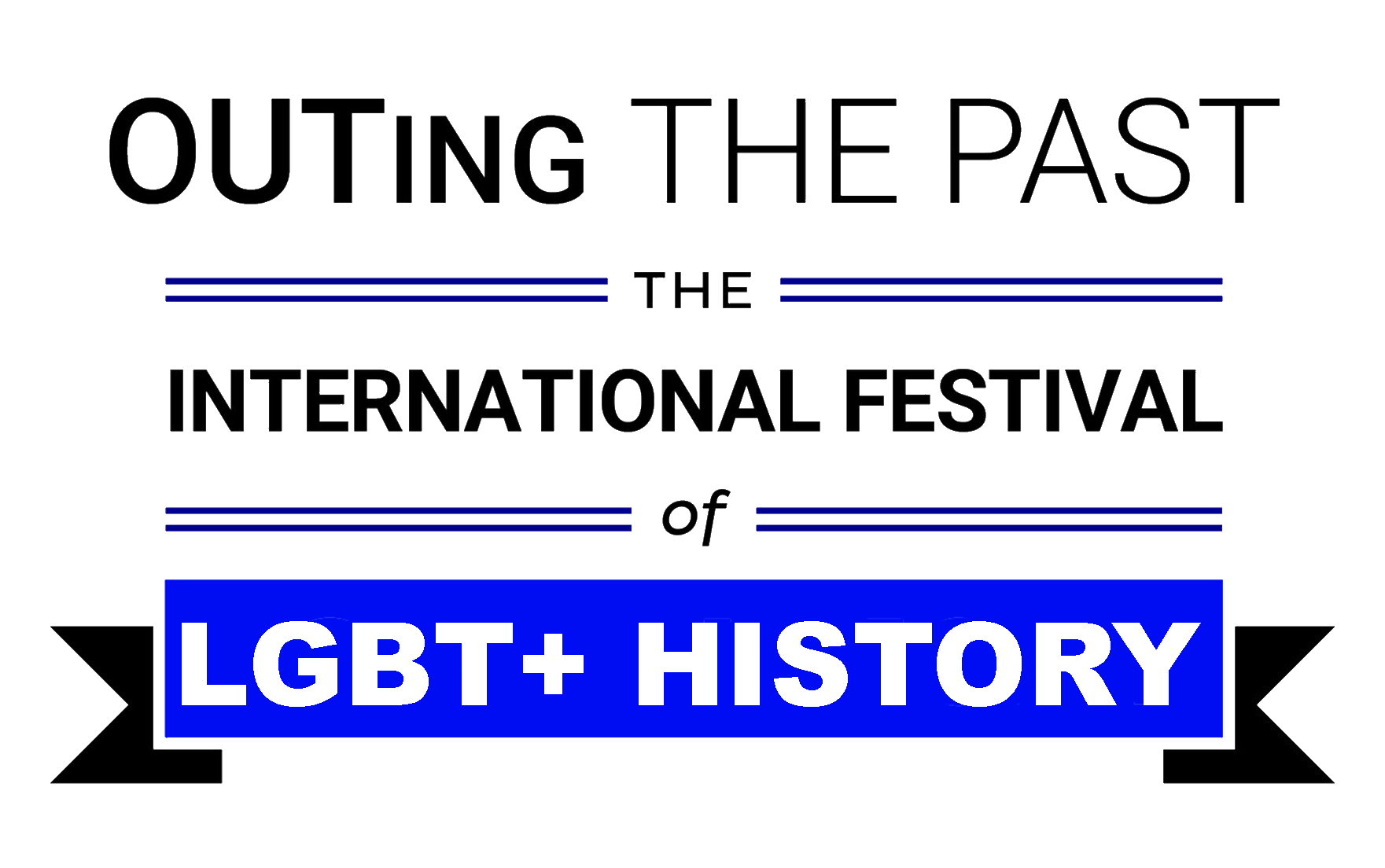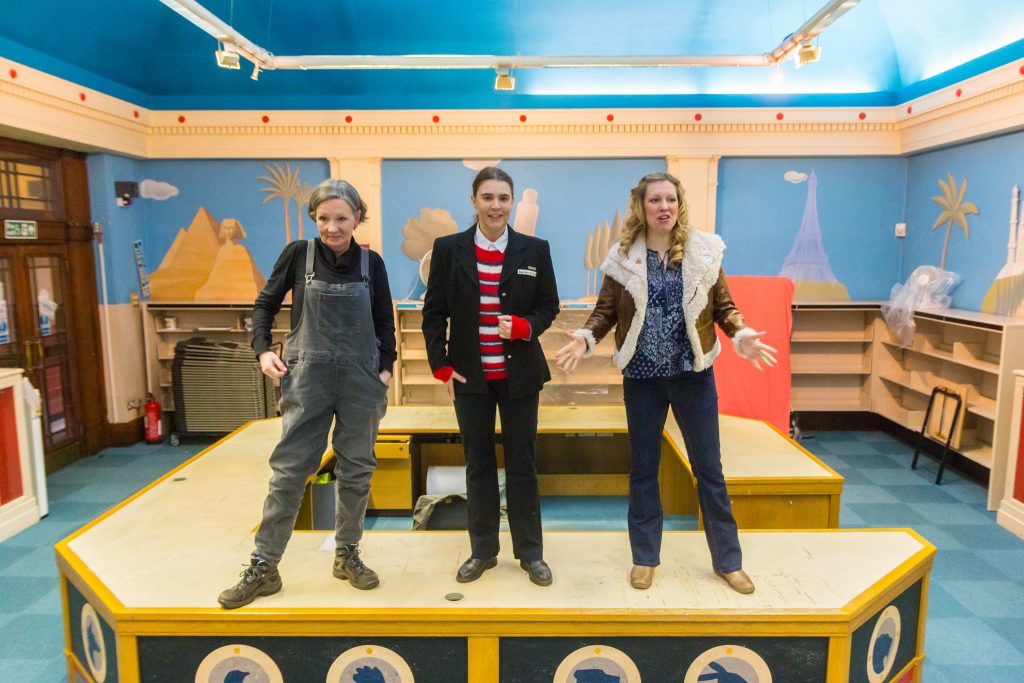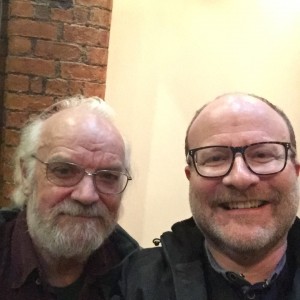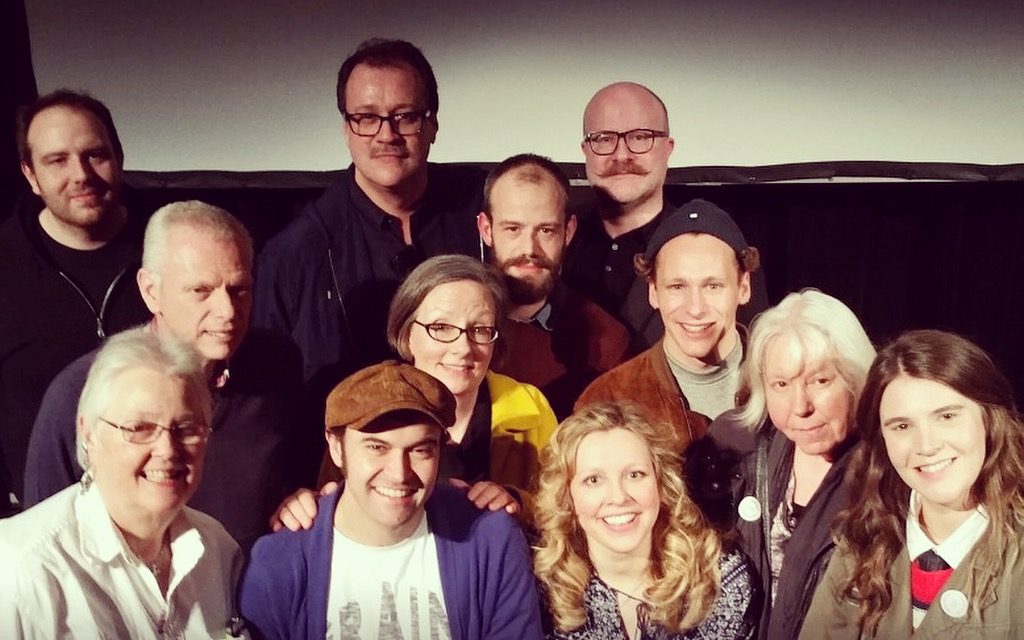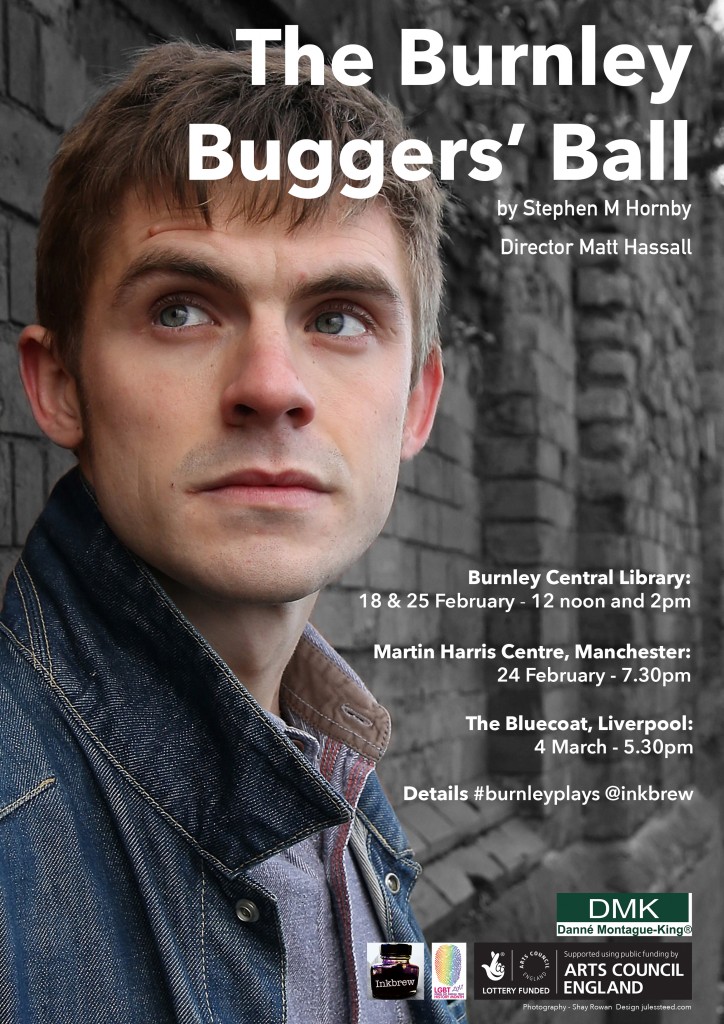Festival Theatre 2017 - "The Burnley Buggers' Ball" & "Burnley's Lesbian Liberator"
This post by Stephen M Hornby, our National Theatre Coordinator, continues our catalogue of Festival Theatre.
DEAN GREGORY AS KEN PILLING, JOSEPH CARTER AS RAY GOSLING AND MICHAEL JUSTICE AS ALLAN HORSFALL (LEFT TO RIGHT) (PHOTO SHAY ROWAN)
2017 marked the 50th anniversary of the Sexual Offences Act 2017, which partially decriminalised male homosexuality in England and Wales. In 2007, the 40th anniversary saw two dramatisations to mark the ocassion, one about the Wolfenden Committee, and one about the Monatgu case. Consenting Adults on the BBC followed the deliberations of Lord Wolfenden as he chaired the Government committee set up to consider decriminalisation in 1957, and contrasted it with the story of his gay son. Channel Four offered A Very British Scandal a docudrama of the 1954 prosecution of some prominent upper middle-class men that led to calls for liberalisation and a book by one of the men, Peter Wildeblood, Against The Law. So, we needed something fresh for the 50th, something original and surprising.
We wanted to move the focus from London legislative processes on to what the new law meant for ordinary working-class people as they grappled with its implications. Jeff Evans, National Festival Coordinator for LGBT History Month, suggested that a small mill town in East Lancashire might hold the answer.
It turns out that in the 1970s, Burnley was the UK’s battleground for gay and lesbian rights, with two ground-breaking public struggles at either end of the decade. LGBT History Month commissioned two dramas from Inkbrew Productions to recreate this amazing forgotten history:
The Burnley Buggers’ Ball, by Stephen M Hornby, tells the story of a transformative public meeting held at Burnley Central Library in 1971. The meeting was about the right to open the UK’s first ever LGBT centre in old Co-Operative Society premises. It saw activists from the Gay Liberation Front (GLF) in London join forces with activists from the North West in the Campaign for Homosexual Equality (CHE) for a rare public show of strength to take on local councillors and religious leader who were attempting to sabbotage them.
Burnley’s Lesbian Liberator, by Abi Hynes, dramatises the political activism of Mary Winter, a bus driver sacked for nothing more than wearing a ‘Lesbian Liberation’ badge and left unsupported by her trade union. She fought back against her employers in 1978 using a network of women’s groups across the UK, and staging a demo outside the Burnley Bus Station, one of the first public demands for equal right for LGBT workers.
JUDY HOLT AS MO, EMILY SPOWAGE AS MARY WINTER AND EMILY HEYWORTH AS SUSAN (PHOTO NICOLAS CHINARDET)
The two plays were performed as a double bill and were created with professional actors, writers and directors working with volunteers and a series of local community partners: Burnley Youth Theatre, East Lancs LGBT, Burnley Mechanics, Burnley & Pendle Libraries and Hidden Histories. This was a unique multi-agency collaborative project for Burnley, and a first for LGBT History Month, dramatising events where they actually happened, adding another layer of historic resonance. Peter Scott-Preslandpublished “Amiable Warriors” in 2015, offering the first detailed historial account of the 1971 meeting, and agreed to act as a hsitorical adviser to the project, as did Paul Fairweather who had written an LGBT heritage trail for Burnley invloving research into Mary Winter.
MICHAEL STEED AND STEPHEN M HORNBY (RIGHT)
I gave an interview to Attitude magazine about the plays an extract from which is reproduced below:
“One of the biggest issues I had with dramatising the meeting was that Allan Horsfall, the grandfather of LGBT rights in the UK and one of this year’s heros, didn’t speak. Then, by an extraordinary coincidence, I met Michael Steed, who was one of the original speakers at the meeting and he agreed to an interview. Michael’s recall of events is incredibly detailed and what he decides to reveal to me for the first time is amazing. It challenges the published historical accounts of the meeting and it gives me a way to tell the whole story from Allan’s perspective.
And then I hear about Mary Winter. In 1978, Mary was a bus driver who was sacked for wearing a Lesbian Liberation badge to work. She turned to her union for support, but they refused to give it to her. Mary got Vanessa Redgrave involved in her struggle and staged a demo outside Burnley Bus Station (conveniently just behind the library).
I’ve written The Burnley Buggers’ Ball about the 1971 meeting and found the wonderful Abi Hynes to write Burnley’s Lesbian Liberator about the 1978 demo. The two plays form a double bill with an ensemble cast and take place both in the original sites of the events in Burnley.
If I had to find a cheesy strapline for these two plays it would be: They lost their fights so that we could win the war. But history rejects this compression. History is always complex and often contradictory. It is a way of forgetting as much as remembering, as any minority knows.”
Both plays were made possible with funding from the Arts Council of England and support from project patron Russell T Davies, tv writer and producer of such gems as Doctor Who, Queer As Folk and Cucumber, who said:
RUSSELL T DAVIES (BACK ROW, CENTRE) AND SUE SANDERS (FRONT ROW, FAR LEFT) WITH THE CAST (PHOTO NICOLAS CHINARDET)
“This is precisely what LGBT History Month should be doing, uncovering hidden history, finding great stories and bringing them to life again for new audiences. And who knew they’d both be about Burnley! It’s marvellous to think of this mill town in East Lancashire being the centre of the struggle for UK gay and lesbian rights in the 1970s.”
Professor Sue Sanders, National Chair of LGBT History Month said:
“These are two little known but crucial events in UK LGBT history. These are the watershed moments of resistance, of self-assertion and collective organisation. These are the moments when we as a community first stood up in public and said, ‘NO’. Our work is to unbury these stories that prove that as a community we have been active, aware and clear about the work that needs to be done to ensure both individual rights and civil rights. The dramatisation of these stories brings to life the struggle that all minority communities have gone through to gain their rights.”
The plays were given six packed performances at Burnley Central Library, The Martin Harris Centre in Manchester and the The Bluecoat in Liverpool. Both plays were professionally filmed to enable audiences nationally to enjoy the performances.
Listen to Abi and Stephen’s BBC Radio 5 Interview Here
To read Stephens full article in Attitude click here. Download the promotional posters for the two plays by clicking the images below.
